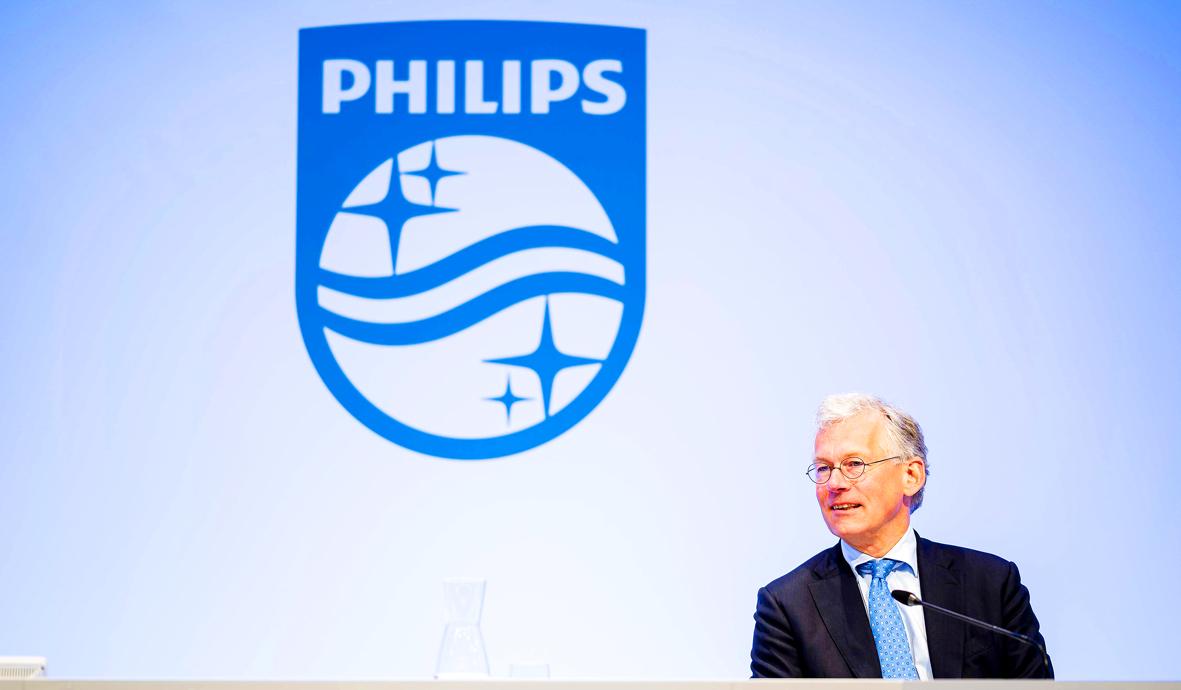Dutch firm Royal Philips NV yesterday said that net profit fell in the second quarter due to the COVID-19 pandemic, but said it expects to return to growth in the second half of the year.
Philips, which recently abandoned its home appliance arm to focus on the health sector, said its net profit sank 14.63 percent year on year to 210 million euros (US$240.35) compared with 246 million euros last year.
“As anticipated, COVID-19 caused a steep decrease in consumer demand,” with the effect on non-virus hospital procedures involving its equipment having a particular impact, Philips chief executive officer Frans van Houten said in a statement.

Photo: EPA-EFE
Sales dropped 6 percent year-on-year to 4.4 billion euros.
Demand for equipment including driven by CT imaging systems, hospital ventilators and patient monitors caused orders to grow by 27 percent.
“We have steeply ramped up the production volumes of acute care products and solutions to help diagnose, treat, monitor and manage COVID-19 patients,” Van Houten said.
“We expect to return to growth and improved profitability for the group in the second half of the year, assuming we can convert our existing order book ... elective procedures normalize, and consumer demand gradually improves,” he said.
Philips started off as a lighting company more than 100 years ago, but has undergone major changes in recent years.
It first divested its lighting division before announcing in January it was selling off its home appliance arm to fully concentrate on health sector products.

US SANCTIONS: The Taiwan tech giant has ended all shipments to China-based Sophgo Technologies after one of their chips was discovered in a Huawei phone Taiwan Semiconductor Manufacturing Co (TSMC, 台積電) suspended shipments to China-based chip designer Sophgo Technologies Ltd (算能科技) after a chip it made was found on a Huawei Technologies Co (華為) artificial intelligence (AI) processor, according to two people familiar with the matter. Sophgo had ordered chips from TSMC that matched the one found on Huawei’s Ascend 910B, the people said. Huawei is restricted from buying the technology to protect US national security. Reuters could not determine how the chip ended up on the Huawei product. Sophgo said in a statement on its Web site yesterday that it was in compliance with all laws

SPEED OF LIGHT: US lawmakers urged the commerce department to examine the national security threats from China’s development of silicon photonics technology US President Joe Biden’s administration on Monday said it is finalizing rules that would limit US investments in artificial intelligence (AI) and other technology sectors in China that could threaten US national security. The rules, which were proposed in June by the US Department of the Treasury, were directed by an executive order signed by Biden in August last year covering three key sectors: semiconductors and microelectronics, quantum information technologies and certain AI systems. The rules are to take effect on Jan. 2 next year and would be overseen by the Treasury’s newly created Office of Global Transactions. The Treasury said the “narrow

TECH TITANS: Nvidia briefly overtook Apple again on Friday after becoming the world’s largest company for a short period in June, as Microsoft fell to third place Nvidia Corp dethroned Apple Inc as the world’s most valuable company on Friday following a record-setting rally in the stock, powered by insatiable demand for its specialized artificial intelligence (AI) chips. Nvidia’s stock market value briefly touched US$3.53 trillion, slightly above Apple’s US$3.52 trillion, London Stock Exchange Group data showed. Nvidia ended the day up 0.8 percent, with a market value of US$3.47 trillion, while Apple’s shares rose 0.4 percent, valuing the iPhone maker at US$3.52 trillion. In June, Nvidia briefly became the world’s most valuable company before it was overtaken by Microsoft Corp and Apple. The tech trio’s market capitalizations have been

SPECIALIZIATION: OpenAI is designing a new type of semiconductor with Broadcom that would run artificial intelligence software and respond to user requests OpenAI is working with Broadcom Inc to develop a new artificial intelligence (AI) chip specifically focused on running AI models after they have been trained, according to two sources familiar with the matter. The AI start-up and chipmaker are also consulting with Taiwan Semiconductor Manufacturing Co (TSMC, 台積電), the world’s largest chip contract manufacturer, said the sources, who asked not to be identified because the discussions are private. OpenAI has been planning a custom chip and working on such uses for the technology for about a year, but the discussions are still at an early stage, the sources said. OpenAI declined